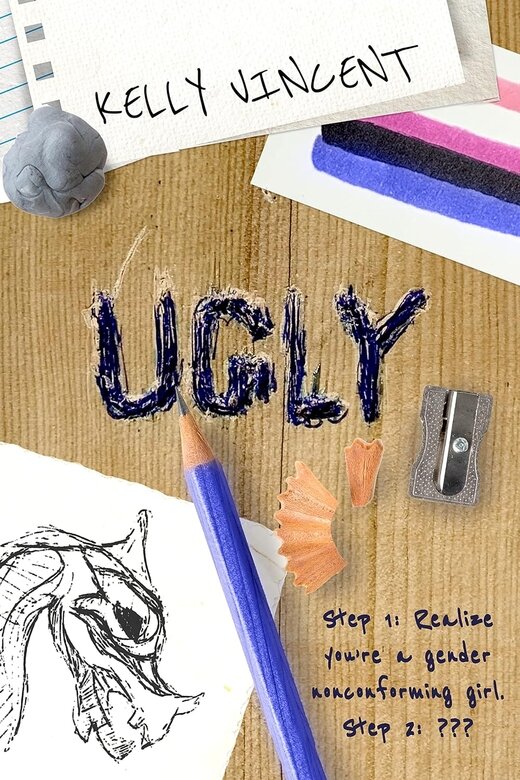A raw and poignant exploration of a teenager’s quest for identity, Ugly by Kelly Vincent is a potent study of the harsh realities of high school social hierarchies and personal uncertainties.
At the heart of this contemporary YA novel is Nicole Summers, a fifteen-year-old from a small Oklahoma town who becomes the embodiment of anyone who has ever felt misunderstood or misplaced. Nicole, or Nic as she prefers, is not your typical high school protagonist – overweight and often cruelly labeled as an “ugly lesbian” despite her interest in boys, Nic’s challenges are compounded by her best and only friend Sam’s impending move to Scotland, which forces Nic to confront her solitude and the daunting prospect of navigating high school without her confidante and partner-in-escapism through their shared love of art and fantasy.
The narrative strength of Ugly lies in its unflinching honesty and depth of its main character; Nic’s voice is authentic, imbued with the rawness of teenage angst and the burden of self-doubt, sensitively depicting her poignant journey towards self-discovery as she grapples with her sexual and gender identity, stumbling upon the term “gender-nonconforming” in a desperate attempt to find a label that might explain her feelings of discordance with societal expectations. Her struggle is relatable, her fears palpable, and her victories, though small, feel monumental in the context of her personal growth.
Crucially, the novel is more than a story about a teenager’s struggle with gender nonconformity – as all teenagers struggle with identity in one form or another, Nic’s story feels truly universal, but especially for those teens who deviate from the norm in any way. While the story insightfully dissects issues with gender nonconformity, it is also a story of nonconformity in general and triumphing over society’s often rigid and dispiriting expectations. Vincent pulls no punches in depicting the cruelty of peers and the sense of internalized shame that can result from not fitting in, providing a narrative that is heartwrenching but ultimately uplifting, as Nic’s journey is filled with genuine courage and self-acceptance in the face of all-too-common social obstacles.
The narrative pacing is commendable throughout, with short chapters that propel the novel forward without ever cutting corners on character development, a tough balance that Vincent handles expertly. Occasionally, the novel does struggle under the weight of its ambition, introducing a plethora of secondary characters that can sometimes distract from Nic’s personal story. While these characters serve to mirror and contrast Nic’s journey, they occasionally muddle the narrative and feel tangential to the story’s emotional core.
That minor pitfall aside, Vincent’s sensitive exploration of identity, acceptance, and the human need for connection makes Ugly a story that will resonate deeply with anyone navigating the intricate journey of adolescence. For readers looking for a novel that champions the underdog, offers a deep dive into the heartache and triumphs of growing up, and presents a candid look at the struggles facing LGBTQ+ youth, this novel hits all the marks and more, for a valuable addition to contemporary YA literature.
Book Links
STAR RATING
Design
Content
Editing
Get an Editorial Review | Get Amazon Sales & Reviews | Get Edited | Get Beta Readers | Enter the SPR Book Awards | Other Marketing Services
























Leave A Comment